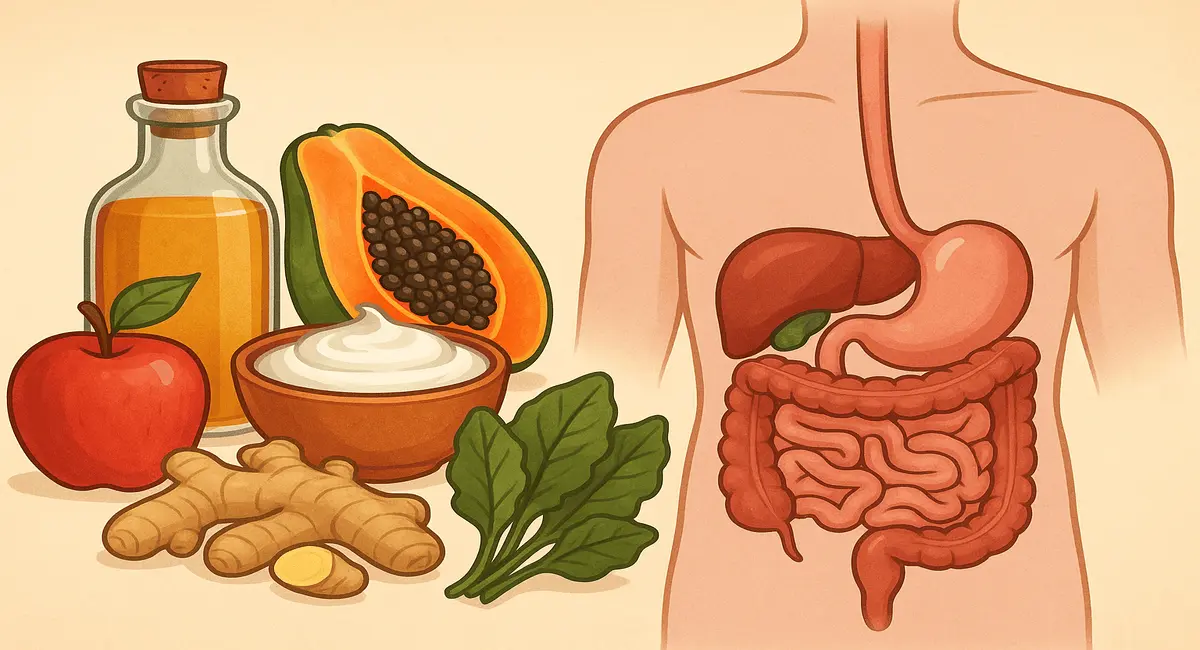A healthy digestive system is essential for supporting your overall well-being and keeping your body working properly. Your gut does more than just break down food—it supports your immune system, affects your mood, and ensures your body absorbs essential nutrients. When digestion isn’t working properly, it can lead to common issues like bloating, constipation, acid reflux, and irritable bowel syndrome (IBS).
The good news? You can naturally improve your gut health by adding the right foods to your daily diet. In this expert-backed guide, we’ll highlight the best foods to support and boost your digestive system—using simple, science-supported tips you can trust.
Table of Contents
1. Yogurt – A Probiotic Powerhouse
Yogurt is one of the best natural sources of probiotics, the “good” bacteria that support a healthy gut. Including yogurt in your diet can be a simple yet powerful way to boost your digestive system and overall well-being.
Benefits of Yogurt for Digestion
Yogurt contains live active cultures such as Lactobacillus and Bifidobacterium, which help maintain the balance of gut flora. These probiotics aid in breaking down food more efficiently, improving nutrient absorption, and preventing common digestive issues like constipation, gas, and bloating.
Regular consumption of probiotic-rich yogurt can also help restore gut health after antibiotic use, support immune function, and may even play a role in reducing symptoms of irritable bowel syndrome (IBS). Additionally, yogurt is rich in calcium, protein, and B vitamins, making it a nutritious choice for your daily diet.
How to Consume Yogurt for Better Digestion
- Eat one serving of plain, unsweetened yogurt daily to maximize probiotic intake without added sugars.
- Mix yogurt with fresh fruits, chia seeds, or a touch of honey for a tasty and wholesome option that’s perfect for a healthy snack or a nutritious breakfast.
- Add it to smoothies, salad dressings, or dips as a healthier alternative to cream-based ingredients.
- Choose Greek yogurt for a thicker texture and higher protein content, especially if you’re managing weight or blood sugar levels.
Pro Tip: Opt for Greek yogurt or homemade yogurt for higher probiotic content and fewer additives.
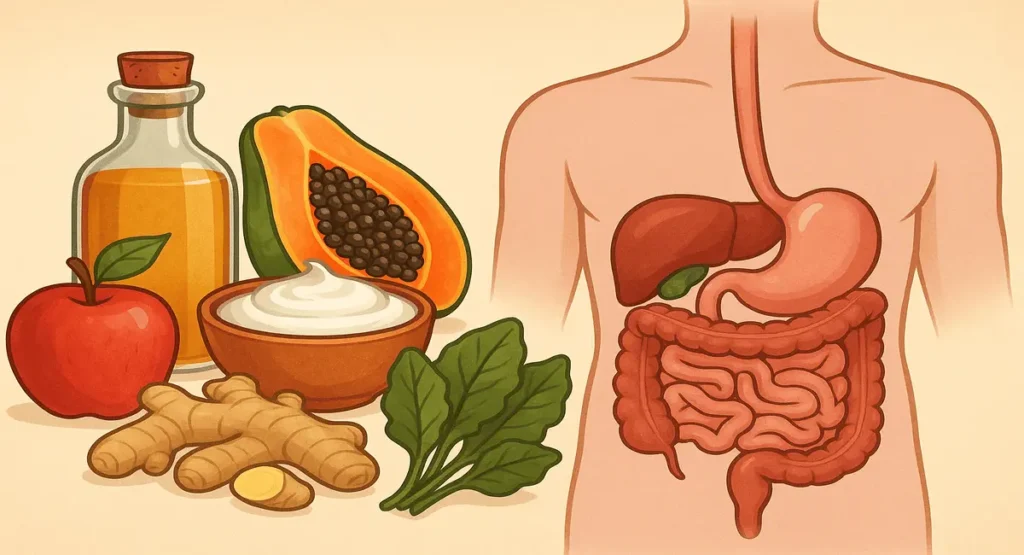
2. Ginger – A Natural Digestive Aid
Ginger is a time-tested herbal remedy known for its powerful digestive benefits. Used in traditional medicine for centuries, this aromatic root is valued for its ability to soothe the stomach and support healthy digestion.
Benefits of Ginger for Digestion
Ginger contains gingerol and shogaol—bioactive compounds that stimulate the production of digestive juices such as saliva, bile, and gastric enzymes. This boost in movement helps food pass through the digestive system more easily, which can lower the risk of bloating, gas, and indigestion.
Scientific studies have shown that ginger can help relieve nausea, especially in cases of motion sickness, morning sickness during pregnancy, or post-surgery. It may also help boost your digestive system by speeding up gastric emptying, which can be especially helpful for those dealing with slow digestion or feeling overly full after meals.
How to Consume Ginger for Digestive Health
- Drink warm ginger tea before or after meals to help your digestion work better and ease bloating.
- Grate fresh ginger into soups, stir-fries, curries, or smoothies for added flavor and health benefits.
- For quick relief from indigestion or nausea, chew a small slice of raw ginger with a little honey.
- Make your own homemade ginger water by boiling sliced ginger in water and drinking it throughout the day.
Pro Tip: Fresh ginger offers the most benefits, but powdered ginger can also be effective when used correctly.
3. Papaya – Packed with Digestive Enzymes
Papaya is a sweet tropical fruit that’s not only tasty but also helps support healthy digestion. Known for its vibrant orange flesh and sweet flavor, papaya is a natural remedy for digestive discomfort and is often recommended for improving gut health.
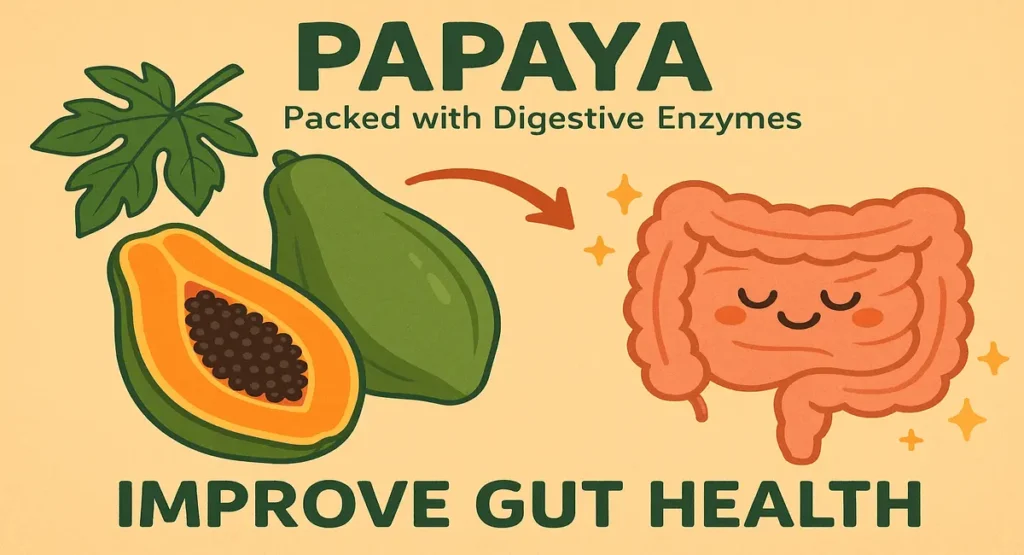
Benefits of Papaya for Digestion
Papaya is rich in a natural enzyme called papain, which breaks down proteins into smaller components like peptides and amino acids—helping to boost your digestive system naturally. This enzymatic activity supports smoother digestion, especially after protein-rich meals, and helps reduce symptoms like bloating, gas, and indigestion.
In addition to papain, papaya is high in water content and dietary fiber, both of which aid in maintaining regular bowel movements and preventing constipation. This fruit is packed with powerful antioxidants such as vitamin C and beta-carotene, which help boost your immune system and calm inflammation in your digestive system.
How to Consume Papaya for Digestive Health
- Enjoy fresh papaya slices as a light, gut-friendly snack or natural dessert after meals.
- Blend papaya into smoothies with banana, ginger, or yogurt for a refreshing and digestive-boosting drink.
- Add cubed papaya to fruit salads for an enzyme-rich addition that enhances both flavor and nutrition.
- For quick relief from bloating, eat a few pieces of ripe papaya on an empty stomach in the morning.
Pro Tip: Choose fully ripe papaya for maximum enzyme content and better digestive benefits.
4. Apple Cider Vinegar – A Natural Gut Tonic
Apple cider vinegar (ACV) has gained popularity as a natural remedy for digestive issues—and for good reason. This fermented liquid is rich in beneficial compounds that can support a healthy gut and enhance digestion when used correctly.
Benefits of Apple Cider Vinegar for Digestion
Apple cider vinegar (ACV) contains acetic acid, which boosts stomach acid production—essential for breaking down food and improving nutrient absorption. This can help ease common digestive issues like bloating, gas, and indigestion.
Raw, unfiltered apple cider vinegar contains the mother—a blend of helpful bacteria and enzymes—that can boost your digestive system by supporting gut health and maintaining a balanced microbiome.
Easy Ways to Take Apple Cider Vinegar for Better Digestion
- Mix one tablespoon of raw, unfiltered apple cider vinegar into a glass of warm water and drink it 15 to 20 minutes before eating to help boost your digestive enzymes.
- Use ACV as a salad dressing base by mixing it with olive oil, herbs, and a touch of honey for added taste and gut benefits.
- Add it to marinades or homemade sauces for a flavorful, health-boosting twist.
- If the taste is too strong, try adding ACV to herbal teas or low-sugar drinks.
Warning: Always dilute apple cider vinegar before drinking. Taking it without diluting can damage your tooth enamel or cause throat irritation.
5. Leafy Greens – Fiber and Magnesium Boost
Leafy green vegetables are packed with nutrients and can help boost your digestive system by supporting overall gut health. Loaded with essential nutrients, they support regularity and promote gut-friendly bacteria.
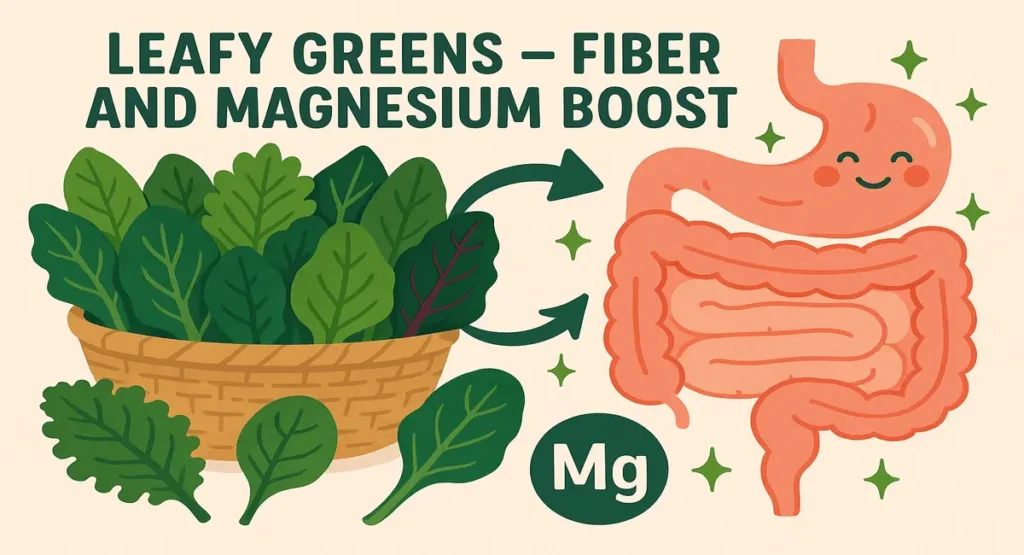
Benefits:
Leafy vegetables such as spinach, kale, and Swiss chard are rich in dietary fiber, which helps make stool bulkier and supports regular, comfortable bowel movements. They’re also rich in magnesium, a mineral that helps relax the intestinal muscles and keeps the digestive process running smoothly.
Additionally, these greens contain natural plant compounds that support the growth of beneficial gut bacteria, reduce inflammation, and may help protect the intestinal lining.
How to Consume Leafy Greens for Digestive Health
- Blend into smoothies with banana and yogurt for a fiber-rich, gut-friendly drink.
- You can mix them into soups, salads, or stir-fries to make your meals more nutritious and add a satisfying texture.
- Steam or sauté with garlic and olive oil for a quick and healthy side dish.
- Mix different greens for variety and maximum benefits.
Pro Tip: Pair greens with healthy fats (avocado, nuts, olive oil) for better nutrient absorption.
6. Physician’s Choice Probiotics – The Ultimate Digestive Support
Looking for an effective probiotic supplement to improve digestion? Physician’s Choice Probiotics 60 Billion CFU offers a potent blend of 10 probiotic strains and organic prebiotics to support gut balance, relieve bloating, constipation, and promote regularity.
Key Benefits:
- 60 Billion CFU per serving for maximum effectiveness
- 10 probiotic strains to promote diverse gut flora
- Organic prebiotics to nourish beneficial bacteria
- Supports immune health and digestion
Get Yours Today: 👉Order Physician’s Choice Probiotics on Amazon Now!
7. Bananas – A Natural Prebiotic
Bananas are one of the most accessible and gut-friendly fruits you can add to your diet. Naturally sweet and easy to digest, they play an important role in supporting digestive health through their fiber and prebiotic properties.
Benefits of Bananas for Digestion
Bananas are rich in dietary fiber, especially a type called resistant starch found in slightly unripe bananas. This fiber acts as a prebiotic, meaning it feeds the beneficial bacteria in your gut, helping them thrive. A healthy gut microbiome supports smoother digestion, nutrient absorption, and overall gut balance.
Bananas are also gentle on the stomach, making them ideal for people dealing with indigestion, acid reflux, or an upset stomach. Plus, their natural pectin content can help regulate bowel movements and reduce bloating, which may further boost your digestive system.
How to Consume Bananas for Digestive Health
- Eat ripe bananas as a quick, portable snack anytime during the day.
- Add sliced pieces to your oatmeal, yogurt, or smoothies to boost fiber intake and enjoy prebiotic advantages.
- Use mashed bananas in baking as a natural sweetener in pancakes, muffins, or banana bread.
Pro Tip: Ripe bananas are easier to digest and soothe an upset stomach.
8. Chia Seeds – High in Fiber and Omega-3s
Small but mighty, chia seeds are a superfood that can help boost your digestive system and support overall gut health. Packed with essential nutrients, they support regular bowel movements and help maintain a healthy gut.
Benefits:
Chia seeds are rich in soluble fiber, which soaks up water and turns into a gel-like substance in your gut, helping with digestion. This helps soften stool, promote smooth digestion, and prevent constipation. The gel also slows down digestion, allowing for better nutrient absorption and longer-lasting satiety.
In addition to fiber, chia seeds are an excellent plant-based source of omega-3 fatty acids, which have anti-inflammatory properties that may benefit gut health and reduce symptoms of digestive discomfort.
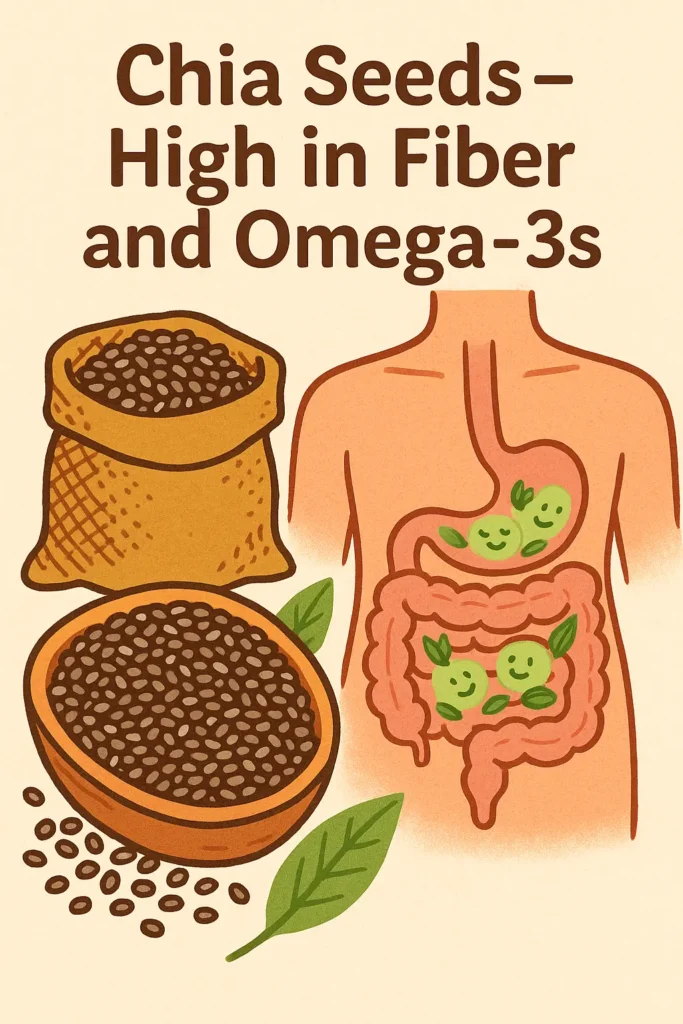
How to Consume:
- Soak in water or milk for at least 30 minutes to make chia pudding—a gentle, fiber-rich treat for your gut.
- Add it to yogurt, oatmeal, or salads to improve both the texture and nutritional value.
- Add it to your smoothies for a simple way to increase your intake of fiber and omega-3s.
Tip: Soak chia seeds in water before eating them to make digestion easier and reduce the chance of bloating.
9. Pineapple – A Source of Bromelain
Deliciously sweet and tropical, pineapple is more than just a tasty fruit—it’s a natural digestive aid. Packed with a powerful enzyme called bromelain, pineapple can support your gut health in a refreshing way.
Benefits of Pineapple for Digestion
Pineapple contains bromelain, a digestive enzyme that helps break down proteins into smaller, more easily absorbed compounds. This process aids in improving digestion and can help reduce bloating, gas, and discomfort, especially after protein-rich meals.
How to Consume Pineapple for Digestive Support
- Enjoy fresh pineapple slices as a post-meal snack to help ease digestion.
- Blend into smoothies with other gut-friendly ingredients like banana or yogurt.
- Add to fruit salads or salsas for a refreshing, digestion-boosting twist.
Tip: Opt for fresh or lightly processed pineapple because canned ones can lose important enzymes and often have added sugars.
10. Fermented Foods – Natural Probiotics
Fermented foods have been used for centuries across cultures to promote better digestion and preserve nutrients. Today, they’re celebrated for their rich probiotic content, which helps restore and maintain a healthy gut microbiome.
Benefits of Fermented Foods for Digestion
Foods like kimchi, sauerkraut, kefir, miso, and tempeh are naturally fermented, meaning they contain live probiotic cultures. These beneficial bacteria improve gut flora balance, enhance nutrient absorption, and support regular bowel movements. Regular consumption may also reduce digestive discomfort such as bloating and indigestion.
Unlike supplements, fermented foods offer a variety of strains in a natural form, often accompanied by fiber, enzymes, and vitamins—all of which support optimal digestive function.
How to Consume Fermented Foods
- Add a spoonful of kimchi or sauerkraut to your meals for a delicious and nutritious side dish.
- Drink kefir daily as a probiotic-rich dairy or non-dairy beverage.
- Stir miso paste into warm soups (do not boil to preserve probiotics).
- Include tempeh in your stir-fries or grain bowls for a nutritious, plant-based protein boost.
Pro Tip: For the most benefits, choose unpasteurized and refrigerated fermented foods, as pasteurization can kill the live cultures.
11. Fennel Seeds – A Traditional Remedy for Digestion
Fennel seeds have been used for centuries in traditional remedies because they help support healthy digestion. These tiny, aromatic seeds are a natural solution to common digestive troubles and are especially popular in Indian and Mediterranean diets.
Benefits of Fennel Seeds for Digestion
Fennel seeds are a natural solution commonly used to help relieve digestive problems such as bloating, gas, and upset stomach. They contain essential oils such as anethole, which help relax the muscles in your digestive system. This can reduce cramping and discomfort after eating. Fennel seeds help your body make digestive enzymes that break down food smoothly and effectively.
Because of their soothing properties, fennel seeds are often recommended for individuals suffering from Irritable Bowel Syndrome (IBS) or chronic digestive issues.
How to Consume it for Digestive Relief
- Taking a small spoonful of raw fennel seeds after eating can help keep your breath fresh and support healthy digestion.
- Make fennel tea by soaking crushed fennel seeds in hot water—it’s a natural and gentle way to help ease bloating or nausea.
- Add ground fennel to soups, curries, or roasted vegetables for extra flavor and digestive support.
Pro Tip: Keep a small jar of roasted fennel seeds at your dining table to enjoy post-meal digestive comfort naturally.
FAQs About Foods for Better Digestion
What are the best natural foods to improve digestion?
Foods rich in fiber, enzymes, and probiotics are excellent for digestive health. Top choices include yogurt, ginger, papaya, bananas, chia seeds, leafy greens, pineapple, and fermented foods like kimchi and kefir.
How do probiotics help with digestion?
Probiotics are live beneficial bacteria that help maintain a healthy gut flora. They aid in breaking down food, enhancing nutrient absorption, and reducing issues like bloating, constipation, and indigestion.
Can changing my diet really improve digestion?
Yes! Making simple dietary changes—like eating more fiber, drinking enough water, and including natural digestive aids like fennel seeds or ginger—can significantly improve your digestion and gut health.
How quickly do digestive superfoods start working?
While some foods like ginger or fennel seeds may offer quick relief from bloating or gas, consistent intake over a few weeks is often needed to see long-term digestive improvements.
What is the role of digestive enzymes in food?
Digestive enzymes—like papain in papaya or bromelain in pineapple—help break down macronutrients such as proteins, aiding smoother digestion and reducing the burden on your digestive system.
Conclusion: Foods to Boost Your Digestive System
Improving your digestive health doesn’t require drastic changes—just a few mindful additions to your daily diet can make a big difference. Eating foods that are high in fiber, natural probiotics, and digestive enzymes—such as yogurt, papaya, fermented veggies, and leafy greens—can help keep your gut healthy and make digestion smoother and more effective.
These natural remedies can help reduce bloating, ease indigestion, and enhance nutrient absorption, leading to better energy levels and overall well-being.
If you’re looking for an extra boost, consider adding a high-quality probiotic supplement like Physician’s Choice Probiotics 60 Billion CFU to your routine. This clinically formulated product is designed to restore gut balance, relieve digestive discomfort, and support long-term gut health with 10 diverse probiotic strains and organic prebiotics.
👉 Click here to order your bottle of Physician’s Choice Probiotics on Amazon today!
We always recommend our users to contact healthcare professional before taking any medicines or supplements.
Sources
At Make Human Healthy, we are committed to providing accurate and reliable health information. We ensure that all content is backed by scientific research, peer-reviewed studies, and credible health organizations. Our resources are carefully selected to maintain the highest standards of integrity, transparency, and reliability, so you can trust the information we provide.
Healthline:- The 19 Best Foods to Improve Digestion – https://www.healthline.com/nutrition/best-foods-for-digestion
WebMD:- Super Steps to Boost Digestive Health – https://www.webmd.com/digestive-disorders/ss/slideshow-digestion-tips
Medical News Today:- What are the best foods to aid digestion? – https://www.medicalnewstoday.com/articles/326596
Continential Hospital:- Foods That Promote Digestive Health – https://continentalhospitals.com/blog/foods-that-promote-digestive-health/
Cleveland Clinic:- How To Improve Your Gut Health Naturally – https://health.clevelandclinic.org/how-to-improve-your-digestive-tract-naturally
NHS:- Good foods to help your digestion – https://www.nhs.uk/live-well/eat-well/digestive-health/good-foods-to-help-your-digestion/
NIDDK NIH:- Eating, Diet, & Nutrition for Gas in the Digestive Tract – https://www.niddk.nih.gov/health-information/digestive-diseases/gas-digestive-tract/eating-diet-nutrition
Affiliate Disclosure: This post may contain affiliate links. If you make a purchase through these links, I may earn a small commission at no extra cost to you. This helps support the blog and allows me to continue creating helpful content. Thank you for your support!
This content is written by Dr. Arshi Thakur. If you found this content helpful, please consider sharing it on your social media to help others benefit from it!
Please note: Our website services, content, and products are for informational purposes only. Make Human Healthy does not provide medical advice, diagnosis, or treatment.

